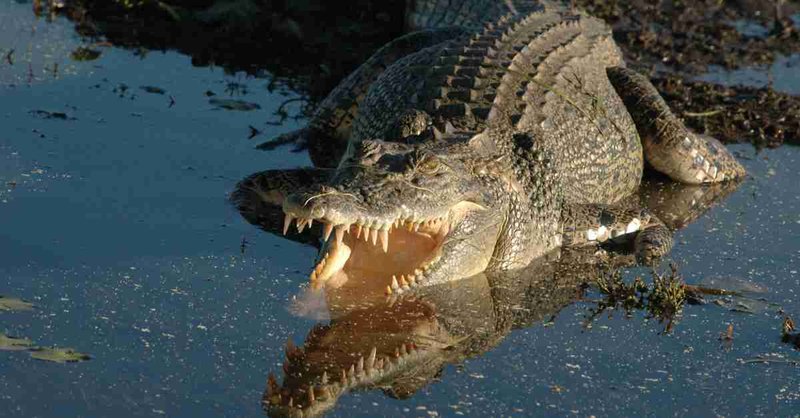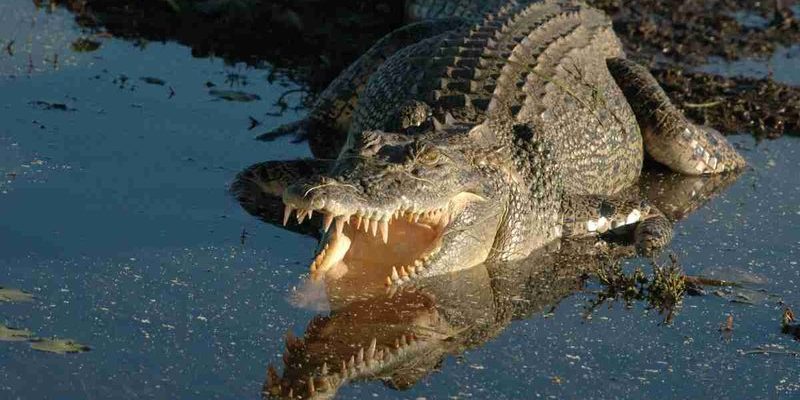
Let’s consider their world for a moment. Imagine stepping into a jungle riverbank where saltwater crocodiles glide silently through the water, using their intelligence to hunt, navigate, and survive. Just as a wolf pack strategizes their moves, saltwater crocs exhibit clever behaviors that demonstrate consciousness and adaptability. So, how smart is a saltwater crocodile, really? Let’s dive into their cognitive abilities and behaviors to uncover the secrets of these amazing creatures.
Understanding Saltwater Crocodile Intelligence
Saltwater crocodiles are not just brutal predators; they’re also clever problem-solvers. Their intelligence largely stems from their evolutionary history. Like many reptiles, their brains are designed for survival, but adaptations over millions of years have led to advanced cognitive functions. These reptiles can exhibit learning and memory, which are key indicators of intelligence.
For instance, studies have shown that saltwater crocodiles can learn from their experiences. They remember the locations of food sources and potential threats, making them savvy hunters. Cognitive mapping—the ability to create mental maps of their environment—allows them to navigate complex river systems with ease, much like you might remember the layout of your favorite café.
The Role of Memory
Memory plays a crucial role in the life of a saltwater crocodile. These creatures can remember specific locations and associate them with past experiences, such as the presence of prey or danger. Imagine a crocodile learning over time that a particular spot is rich in fish or that certain animal tracks lead to a reliable meal. This ability to recall past encounters greatly enhances their survival.
Interestingly, their memory isn’t just short-term. In experiments, crocodiles have demonstrated the ability to remember food locations and avoid dangers for extended periods. This long-term memory helps them thrive in diverse habitats, from swamps and rivers to coastal environments.
Social Intelligence and Interactions
You might be surprised to learn that saltwater crocodiles are social animals. They often live in groups, especially during breeding seasons. This social behavior is not just about being together; it’s also about communication and cooperation. They use a variety of vocalizations, body language, and even posturing to convey messages to one another.
For example, during mating rituals, males and females engage in elaborate displays. You may see males puffing up their bodies, making deep rumbling sounds to attract females. This type of social interaction suggests a level of emotional intelligence and awareness that goes beyond simple instinct, showing they can gauge the reactions of others.
Learning Through Observation
An impressive aspect of their social intelligence is their ability to learn through observation. Just like a child might watch their parent recover a toy from a high shelf, saltwater crocodiles can learn new hunting techniques by watching others. Studies have shown that young crocodiles imitate older, experienced ones, picking up skills that help them survive in the wild.
This observational learning highlights their cognitive flexibility. Instead of relying solely on instinct, saltwater crocodiles can adapt their behaviors based on what they witness. This adaptability is key in their dynamic environments, where survival often hinges on quick thinking and smart strategies.
Hunting Strategies and Problem Solving
When it comes to hunting, saltwater crocodiles are true masters of strategy. They employ a range of techniques depending on their situation and prey. One well-known tactic is known as the “death roll,” where they spin fiercely in the water to incapacitate their catch. But it’s not just brute force; there’s a method to their madness.
They can observe the movement of fish or birds from the water’s edge and calculate the best moment to strike. This level of strategic thinking requires significant cognitive skills. Imagine a chess player meticulously planning their moves; that’s how a crocodile prepares for the perfect moment to catch its prey.
Environmental Adaptability
Saltwater crocodiles also show remarkable environmental adaptability. They can thrive in both freshwater and saltwater, thanks to their unique physiological traits. Their ability to switch environments demonstrates their advanced cognitive abilities. For instance, they utilize different hunting methods and food sources based on their habitat, and they adapt to seasonal changes in their surroundings.
This adaptability isn’t just instinctive; it requires learning and remembering various habitats and their resources. Like a seasoned traveler, they know where to go for food, rest, and safety, which contributes to their longevity in the wild.
Communication: More Than Meets the Eye
Communication is another fascinating aspect of saltwater crocodile behavior. They produce a variety of sounds, including hissing, growling, and even bellowing. Each sound has a purpose: some are for mating calls, while others might signal danger or establish territory.
These vocalizations aren’t random; they reflect their complex lives. Crocodiles have developed a language that helps them interact and express emotions. Think of it as their way of chatting about food, territory, or even potential rivals. This sophisticated form of communication indicates a deeper level of intelligence than many might expect.
Body Language and Posturing
In addition to sounds, body language plays a crucial role in their communication. A crocodile’s posture can convey aggression or submission. For example, a crocodile that raises its head with its mouth open may be displaying dominance, while a more relaxed croc lying low could indicate submission or peace.
By reading these signals, they can avoid unnecessary confrontations or establish hierarchy within their group. It’s a subtle yet critical aspect of their social structure, showcasing their understanding of non-verbal cues.
In summary, the intelligence of saltwater crocodiles is a remarkable blend of memory, social interaction, problem-solving, and communication. They are not just ancient predators but also creatures capable of learning, adapting, and interacting with their environment and each other. Their cognitive abilities challenge our understanding of reptilian intelligence, proving that there’s a lot more beneath their scaly skin.
So next time you see a saltwater crocodile basking in the sun, remember that this formidable creature is also a highly intelligent being, navigating its world with wisdom that’s taken centuries to develop. Whether they’re hunting for their next meal or communicating with fellow crocs, they embody the intricate dance of survival, intelligence, and behavior in the wild.

